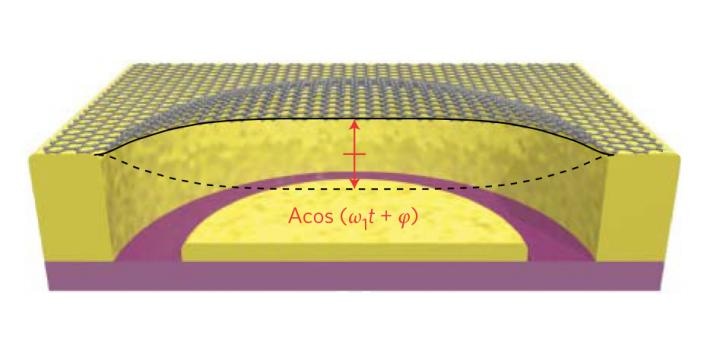May 17 2017
 This is a schematic cross-section of a graphene drum. (CREDIT- ICFO)
This is a schematic cross-section of a graphene drum. (CREDIT- ICFO)
Energy dissipation is a key element in understanding numerous physical phenomena in thermodynamics, nuclear fission, photonics, photon emissions, chemical reactions, or even electronic circuits, among others.
The energy dissipation in a vibrating system is quantified by the quality factor. If the quality factor of the resonator is high, the mechanical energy will dissipate at an extremely very low rate, and accordingly the resonator will be very accurate at sensing or measuring objects thus enabling these systems to become exciting quantum systems, as well as highly sensitive mass and force sensors. For instance, when a guitar string is made to vibrate, the vibration produced in the string resonates in the body of the guitar. Since the vibrations of the body are robustly coupled to the surrounding air, the energy of the string vibration will dissipate more efficiently into the environment bath, raising the volume of the sound. The decay is established to be linear, as it does not rely on the vibrational amplitude.
Now, shrink the guitar string down to nano-meter dimensions to attain a nano-mechanical resonator. In these nano systems, energy dissipation has been perceived to depend on the amplitude of the vibration, defined as a non-linear phenomenon, and up to now no proposed theory has been demonstrated to properly describe this dissipation process.
In a recent research, published in Nature Nanotechnology, ICFO researchers Johannes Güttinger, Adrien Noury, Peter Weber, Camille Lagoin, Joel Moser, led by Prof. at ICFO Adrian Bachtold, in partnership with researchers from Chalmers University of Technology and ETH Zurich, have established an explanation of the non-linear dissipation process with the help of a nano-mechanical resonator based on multilayer graphene.
In their research, the research team used a graphene-based nano-mechanical resonator, perfectly suited for viewing nonlinear effects in energy decay processes, and measured it with a superconducting microwave cavity. Such a system is can detect the mechanical vibrations in a very short span of time as well as being adequately sensitive to detect minimum displacements and over a very wide range of vibrational amplitudes.
The team took the system, forced it out-of-equilibrium with a driving force, and then turned off the force to measure the vibrational amplitude as the energy of the system decayed. They performed more than 1000 measurements for every energy decay trace and were able to see that as the energy of a vibrational mode decays, the rate of decay touches a point where it alters sharply to a lower value. The larger energy decay at high amplitude vibrations can be described using a model where the measured vibration mode “hybridizes” with another mode of the system and they decay in agreement. This is same as the coupling of the guitar string to the body although the coupling is nonlinear with regards to the graphene nano resonator. As the vibrational amplitude reduces, the rate abruptly changes and the modes become decoupled, causing comparatively low decay rates, thus in very huge quality factors beyond 1 million. This sudden alteration in the decay has never been measured or predicted thus far.
Therefore, the results attained in this research have illustrated that nonlinear effects in graphene nano-mechanical resonators expose a hybridization effect at high energies that, if controlled, could pave the way to new possibilities to control vibrational states, to analyze the collective motion of highly tunable systems, and engineer hybrid states with mechanical modes at totally different frequencies.